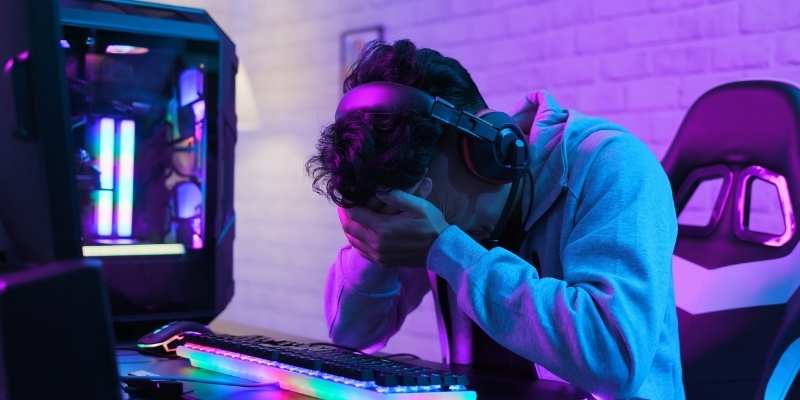Video games, whether on a traditional PC, console, or even on your phone, became utterly mainstream for people from a wide variety of ages, genders, and backgrounds. A recent study showed that there are 3.2B gamers worldwide. And more adults are playing games than children. However, with the rise in online and multiplayer gaming, we’ve also seen a rise in cyberbullying in the gaming environment. Additionally, there’s the thorny problem that hazing online is seen as something we just have to put up with if we want to play. So today, I would like to look at cyberbullying in the gaming community.
Do you have a particular question about cyberbullying in the gaming community? Then use the table of contents below to jump to the most relevant section. And you can always go back by clicking on the black arrow in the right bottom corner of the page. Also, please note that some of the links in this article may be affiliate links. For more details, check the Disclosure section at the bottom of the page.
Here's what we'll cover:
Does Gaming Online have Benefits for Adults?
Being part of a gaming community has a lot of benefits, helping people develop their cognitive, social, and emotional skills. Additionally, games help with problem-solving, motor skills, creativity, and strategizing skills, things everyone needs to keep fresh for work and social environments.
Multiplayer gaming, in particular, helps teach people to work well with others and allows a healthy outlet for emotion. Gaming can help people identify and work through emotion, boost mood, and soothe anxiety in a great online environment. They can also be a great arena for people to socialize and make new friends, which can be tough for working adults.
Why Cyberbullying Exists in Online Gaming
However, that same degree of online interaction can create a space for cyberbullying. While sometimes tied to (perceived) underperformance in team games, cursing and negative remarks, alongside “dogpiling” or group bullying, is sometimes targeted at players for differences like race, ethnicity, background, and gender, which can lead to cyberbullying on gaming platforms. This becomes especially problematic when players can hide behind usernames and anonymous identities online, as with social media platforms. Additionally, accountability can be difficult to enforce when a player can make a new account and continue their behavior under a different alias.

Additionally, for those invested in harassing a particular target, ‘doxing’ becomes a worry. Doxing occurs when harassers deliberately seek out identifying personal information of a target.
Lastly, while not unique to online gaming, any space where people congregate online to share tips and strategies and create team activities is at risk to cybercriminals looking to bait others with fake links or indulge in predatory behavior.
Sadly, some aspects of modern online gaming actively encourage what is often framed as “hazing” or “griefing” through name-calling and other bullying-adjacent activities. In itself, this is problematic socialization and can quickly spill over to active bullying as well as be used as a smokescreen for it.
Preventing Gaming-Related Cyberbullying
What can we do to help root out these problematic behaviors?
For parents, it pays to be actively invested in making your gaming activities a happier, healthier community. So whether you’re a gamer yourself or simply have one in your family, don’t write it off as “silly” or “wasteful.” Remember, tons of adults still enjoy unwinding online with friends in games, and it’s a typical modern pass time.
Be aware of the gaming communities and gaming-related social media and apps you are using. Stay engaged, especially if it’s a community shared by minors or teens. Sadly, this age group is the most likely to behave like bullies online but also the most vulnerable to bullying behaviors and may need an engaged adult’s help in a tricky situation.
Make sure you stay up-to-date on the latest online safety protocols and know how to spot predatory behavior and scams. Additionally, tempting as it may be to “get ahead” in a game you can only play in your downtime, don’t fall for the lure of bots that can bring malicious software and activities to your PC screen. Finally, be wary about revealing personal details online, even if you’ve become quite friendly with your gaming community. Ensure you’ve set up appropriate privacy and security settings to watch your back. And don’t be afraid to set reasonable rules for yourself around the time spent online. It’s easy to get so caught up in the fictional world that we forget about other responsibilities or push too many of them off on our partner to handle- and the longer you stay immersed in the sometimes hyper-competitive gaming environment, the easier it is for your temper to fray and bad behavior to come pouring out. Remember, you can be the bully as easily as the one being bullied.
In fact, let’s take a moment to look at the idea of emotional regulation. It’s become something of a psychological buzzword of late, particularly as it pertains to raising children. Still, it’s a fundamental skill for adults too. One we were supposed to learn ourselves in our formative years, but which often wasn’t taught to us.
Particularly for older generations and men, who are often actively encouraged to rant and rage as a “masculine” emotional outlet instead of managing their emotions productively. Never underestimate the power the longing for peer acceptance can have on you, even as an adult. Adults are very prone to behaving differently in group settings, and sadly it’s usually for the worse, too.
What if I am Being Bullied Online?
So there’s a lot we can do as adults to make the gaming world happier and healthier. And we can keep a careful watch on our behavior to ensure we’re not bullying others. But what can you do if you witness bullying or are the target of it yourself?
First, don’t assume you must suffer in silence just because you’re an adult. Cyberbullying has no age limit, and it’s as harmful to adults as it is to younger players.
If active bullying incidents occur:
● Speak up against online bullies instead of joining in
● Block, defriend, and report players who are bullying
● Know when to step away from a game and relax instead of indulging in negative behaviors
● Reach out to friends or a support group for help.
Engaging in online gaming activities as an adult gives you immense power to act when you notice problematic behaviors, whether you and your peer group are the victims or the aggressor. By encouraging overall healthy emotional regulation and behavior and keeping yourself informed about the risks of living online, you can help ward off bullying behavior and ensure you are an online “safe space” others can trust, young and old.
Remember, if you practice good online behavior, regulate your emotions healthily (no throwing keyboards around and punching screens). Keep safe online practices front-and-center of your mind to enjoy healthy online gaming without risk and fear.
Credits: Thanks for the photo to Canva.

At ipoki.com we only mention the products that we’ve researched and considered worthy. But it’s important to mention that we are a participant of several affiliate programs, including Amazon Services LLC Associates Program, an affiliate advertising program designed to provide a mean for us to earn fees by linking to Amazon.com and affiliated sites. As an Amazon Associate ipoki.com earns from qualifying purchases.


